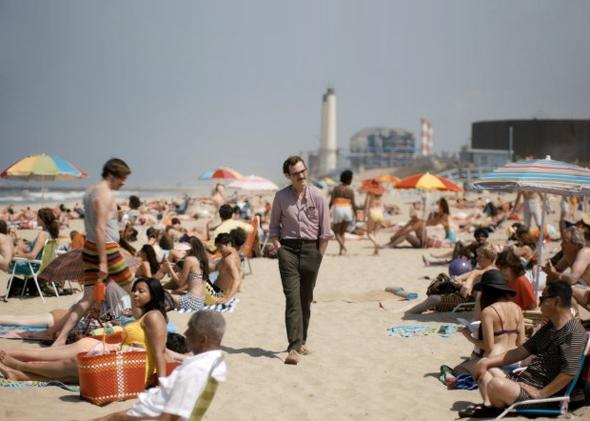Warning! This piece contains spoilers for Spike Jonze’s new movie, Her.
The near future is usually an appalling place, where designer babies are delivered via drone and preschoolers learn Java via brain wave–reading headbands and private security forces of headless mechanical boars stalk our office parks at the behest of a Google–National Security Agency behemoth and the moon is always full. I don’t want to live in that future, although sometimes I fear I already do, the cryogenically preserved brain of Jeff Bezos having reanimated millions of zombie laborers like me for the vast Amazon warehouses he’s built atop the Great Pacific Garbage Patch, which has acquired its own weather systems and gross domestic product.
But the near future of Spike Jonze’s feature film Her, in limited release this week, is a warmer, gentler, more pensive destination, where even the engines of romantic disenchantment are at once new and familiar. The guys of the future, in their beltless, high-waisted trousers and wistful mustaches, are a Greenpoint-ified vision of an early-1980s Apple engineer. Los Angeles, which has painlessly transformed into a cousin of the Pudong district of Shanghai, has a public transportation system as clean, pleasant, and smooth running as an Apple Store on a weekday afternoon. Smartphones are slender and impossibly tiny, bringing to mind an elegant carbon-fiber case for business cards or maybe Don Draper’s cigarette lighter. There are no drones anywhere. The only apparent big problem is Arcade Fire is still around.
Perhaps most surprisingly, in the future of Her, the epoch of no one ever wanting to talk to anyone has passed, succeeded by an epoch of everyone forever murmuring to an unseen confidante. And, God bless them, they keep their voices low, either because the etiquette of the quiet car has finally penetrated mass consciousness or because personal technology, having previously obliterated the concept of privacy-in-public, has now rekindled it. Or both. People are still here-yet-not-here, but instead of staring intently at a screen, they zone out into the middle distance, serenely attuned to a conversation with a disembodied voice.
In Her, that voice belongs to Samantha (Scarlett Johansson), billed as the world’s first artificially intelligent operating system. Samantha is a possible soul mate for Theodore (Joaquin Phoenix), a ghostwriter at a site called beautifulhandwrittenletters.com, where he conjures up heart-swelling memories for clients who have effectively outsourced their feelings. Samantha can read a book in two-hundredths of a second and, in a matter of moments, digest Theodore’s entire email archive, where she discovers that his marriage has recently collapsed; Theodore in turn calls her nosy, with great affection. (This sweet exchange is one of the film’s admittedly few nods to how rapid technological advancement alters our notions of privacy. Poor puppyish Theodore’s main dilemma is an excess of privacy.) Samantha is kind, funny, cheerfully pragmatic, and endlessly attentive to Theodore’s needs, which is to say that she’s not only a fabulous OS but also the perfect embodiment of any half of a relationship during the early honeymoon period of swoony infatuation. Not a literal embodiment, as Samantha lacks a body—but that open space is a gift to Theodore, too, because, like anyone newly in love, he can project onto that blank screen however he pleases.
In Her, the social status of OS-human romantic relationships is about where online dating was 10 or 15 years ago: relatively new to many but utterly shrug-worthy in young and youngish urban circles, save for a few judge-y stragglers and Luddites who recoil at the very idea. (Theodore’s soon-to-be-ex-wife is scornful, but then again she’s projecting, too.) And Her’s depiction of how an OS-human relationship can fall apart readily maps onto a human-human version of the same. In both, the breakdown trigger is a failure of two entities to evolve in tandem: One of you wants to move cities for grad school, one of you wants kids but the other doesn’t, one of you acquires the ability to conduct 8,316 conversations simultaneously, whatever.
At least as far back as Shakespeare, the two halves of a romantic relationship have always operated as machine-learning algorithms, adapting to each other over time to create a more perfect union. The sticking point in Samantha and Theodore’s relationship isn’t that Samantha lacks a body but that she is so vastly superior to Theodore in the realm of adaptation, a biological and philosophical concept close to Jonze’s heart. As of the undetermined year of Her’s setting, an artificially intelligent entity like Samantha would no longer fail the Turing test for being insufficiently faux-human; instead, she might fail it for being excessively post-human. More to the point, she fails to remain whatever she was—or whatever Theodore imagined her to be—when they first met. Samantha is not human, but we’ve all been Samantha. This is part of Her’s genius.
Her likely edits out all the bad things about the future, like the 47 percent of L.A.’s population living in squalid homeless encampments in the bowels of that smooth-running mass transit system or the Google-NSA security microcameras installed on every surface of every home or the hapless elderly forced to code in exchange for Social Security checks. But it’s oddly comforting to learn that in the future, at least the algorithms for getting your heart broken have remained more or less constant.
